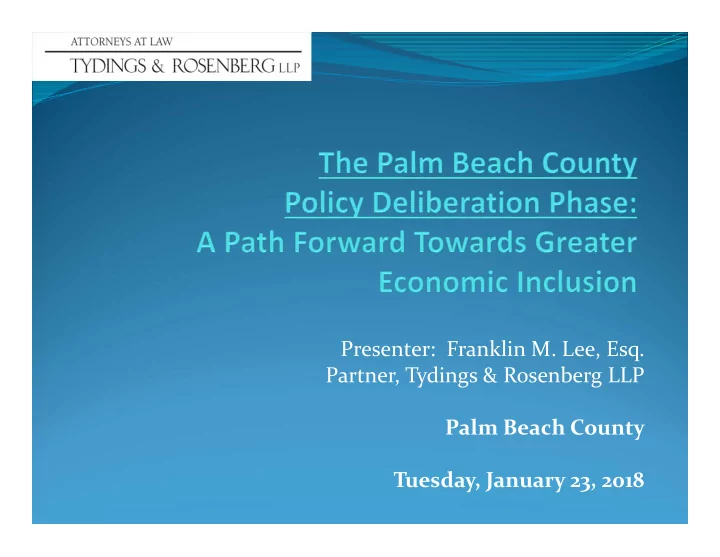

Presenter: Franklin M. Lee, Esq. Partner, Tydings & Rosenberg LLP Palm Beach County Tuesday, January 23, 2018
Introduction About the presenter: Franklin M. Lee, Esq.: Education / Training (U. of Chicago undergraduate B.A. - social sciences, political science, econometrics, U. of Chicago School of Economics graduate courses; NAACP Asper Fellowship, U. of MD School of Law, J. D.) Antitrust Litigator (FTC) (Bureau of Competition in assoc. w/ Bureau of Economics) Civil Rights Lawyer (Chief Counsel, MBE Legal Defense & Education Fund, Inc.) 2
Introduction (continued) Private Practice Client Base (Partner, Tydings & Rosenberg LLP) -- SLMBE Public Policy Matters San Antonio, TX Charlotte, NC San Diego, CA Miami-Dade County Public Schools State of Maryland School Board of Broward County City of Baltimore Austin, TX Columbia, SC The Metropolitan District (CT) Richland County, SC Washington Suburban Sanitary Commission Macon-Bibb County Palm Beach County School Board 3
The Legal Framework: Potential Challenges to Economic Inclusion Policies Strict Scrutiny When is it required? To examine government use of a racial preference To examine government use of a racial classification 4
Two Prongs of Strict Scrutiny 1 st Prong: Compelling Interest MTA Disparity Study provided a ‘strong basis in evidence’ That “factual predicate” provides a roadmap to remedies 1. Identification of where disparities exist 2. Identification of the nature & form of barriers, and root causes of disparities. 5
Two Prongs of Strict Scrutiny 2 nd Prong: Narrow Tailoring of Remedies Consideration of “race-neutral” remedies Consideration of appropriate “race-conscious” remedies only when it appears that neutral remedies, in and of themselves, are inadequate Limited duration; periodic review; limited by ethnicity/gender, industry, & form of discrimination Forms of remedies: Follow the Road Map of the Factual Predicate 6
The Policy Deliberation Phase The Disparity Study as a Diagnostic Tool Identifies “symptoms” of unhealthy markets and appropriate policy “remedies” for addressing identified barriers to mainstream economic inclusion of all segments of business community Race- and gender-neutral medicine Race- and gender-conscious medicine Policy options that are legally defensible Policy options that are effective / best practices 7
The Policy Deliberation Phase Recommend features for proposed policy options to address each barrier identified in Study. Cite relevant findings and “diagnoses” from Disparity Study that support consideration of each proposed policy option. Summarize key pros and cons for each proposed policy option remedy. 8
Finding the Right Prescription: Palm Beach County’s Doctor’s Bag for Economic Inclusion… 9
Diagnosing and Treating Barriers to Economic Inclusion Diagnoses based upon totality of evidence (“strong basis”) regarding race/neutral and race/conscious causes of marketplace disparities Prescribe appropriate course of treatment Narrowly tailored remedies (consider progression from least aggressive to most aggressive and effective treatment options) The right medicine at the right dose (goal setting) Assess resource constraints for effective administration of remedies 10
Assess Strengths & Weaknesses of Study Results Data Methodologies – Quantitative and Qualitative Historical Context Statistical Patterns of Exclusion and Disparity Inferences of Discrimination from Study Results Control for Alternative Explanations Anecdotal Evidence -- Symptoms and Perceptions 11
Treatment Options for Economic Disparity… Race-Neutral vs. Race-Conscious Remedies Industry-specific Construction Professional Services Goods and Services Non-industry specific: bid-debriefings, financing, technical assistance, commercial non-discrimination, de-bundling, specification review, centralized bidder registration system. 12
Treatment Options for Economic Disparity… Race-Neutral Remedies Small Business Enterprise Prime Contract Program SBE Subcontracting Program HUBZone Program (Glades Local Preference) Bonding Assistance SBE Mentor-Protégé Program SBE Low-Cost Wrap Up Insurance (“OCIP”) 13
Treatment Options for Economic Disparity… Race-Neutral Remedies Construction Direct Purchasing SBE Vendor Rotation Evaluation Preferences Evaluation Panel Diversity SBE Reserve 14
Treatment Options for Economic Disparity… Race-Conscious Remedies Annual M/WBE Aspirational Goals M/WBE Joint Venture Incentives M/WBE Contract-Specific Subcontracting Goals M/WBE Mentor-Protégé Program Minority Inclusion Language in RFPs / Evaluation Preferences M/WBE Vendor Rotation 15
REMAINING STEPS FOR A NEW PROGRAM Formal acceptance of MTA Disparity Study findings and recommendations by County Board Design a course of treatment (menu of policy options) Obtain feedback from County Staff and Business Stakeholders on Draft Policy Options County Board approval for drafting revised policies based on totality of evidence and feedback Public feedback and Board adoption / modification of draft SLMWBE policies 16
REMAINING STEPS FOR A NEW PROGRAM Implementation Plan: Timeline for Completion Short Term (30 to 60 days) – identify priorities for partial changes to policy and/or administrative practices to be achieved immediately; Mid-term (6 mos.) – implement short-term changes to policy and administrative practices; outreach to business community; apply short-term amendments of policies to solicitations and contracts; Long-term (12 mos.) -- Complete overhaul of all SLMWBE Policies and administrative practices; final approval by County Board of amended contracting and procurement procedures; requisite upgrades to staffing, technology, and administrative resources completed. 17
QUESTIONS??? Contact: Franklin M. Lee, Esquire Partner Tydings & Rosenberg LLP 100 East Pratt Street, 26 th Floor Baltimore, MD 21202 (410) 752-9734 E-mail: flee@tydingslaw.com 18
Recommend
More recommend